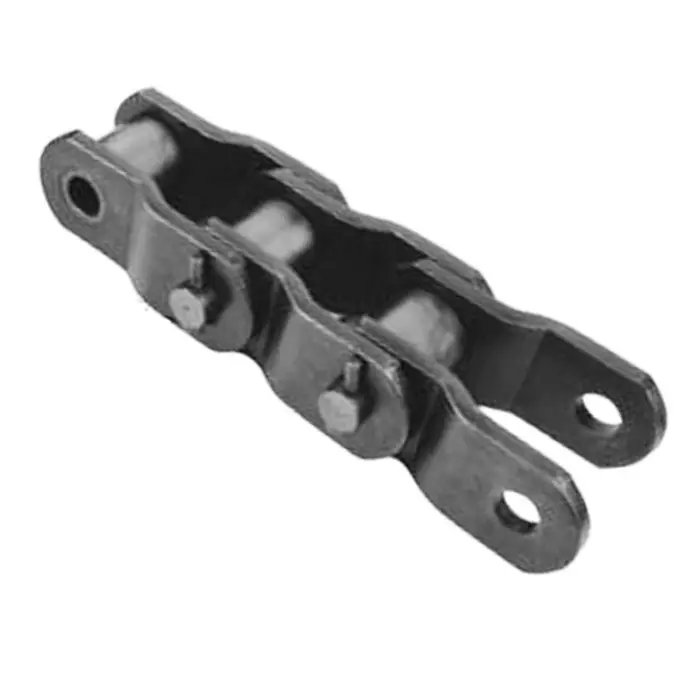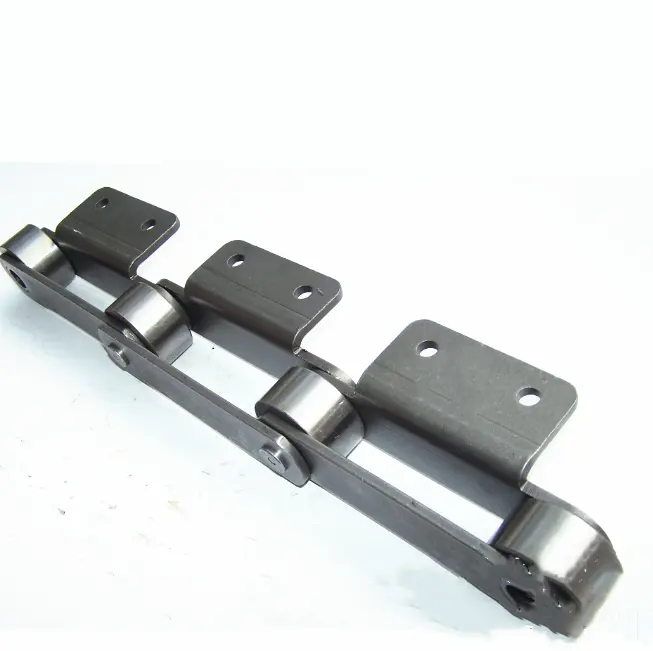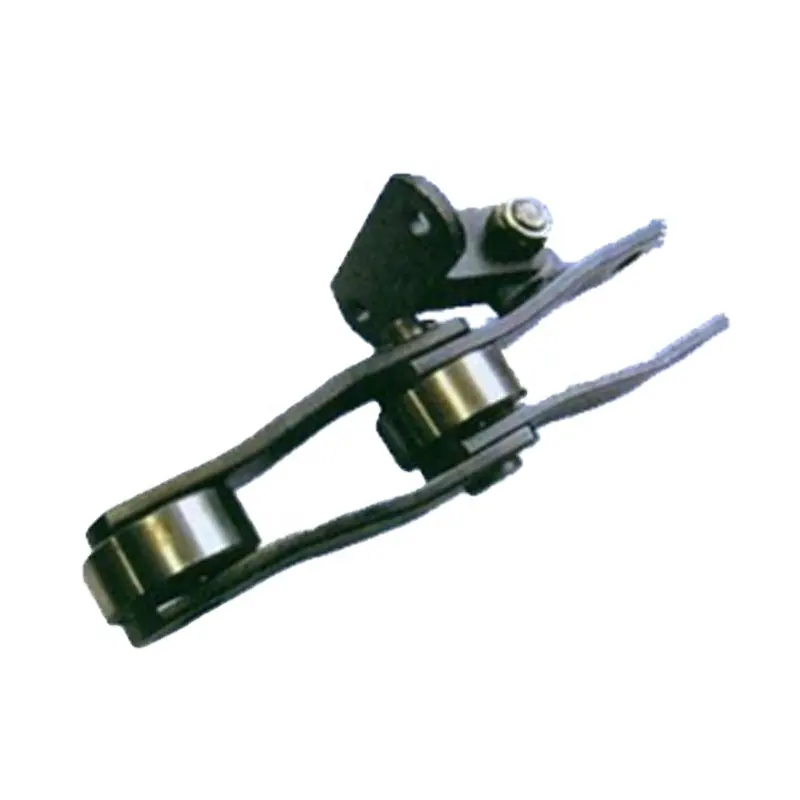Product Description
Conveyor chains for paper mill
conveyor chains with V-shaped top plates are used almost exclusively to handle paper rolls. The outboard rollers have a wider wheel gauge and provide more stability for the rolls.
conveyor chains are primarily used for handling paper rolls. Typically the conveyors are long and handling large or heavy loads requiring a heavy-duty chain as well.
Conveyor chains is widely used in Food,Forest Paper,Logistics Transportation,Packaging Machinery,Building Materials Machinery ,Environmental Protection and other other industries.
Typical products:
short pitch roller chain, double pitch conveyor chain, free flow chain, wood conveyor chain, long pitch conveyor chain, meat production line conveyor chain, food packaging machinery chain, hollow pin chain and accessories.
The paper roll conveying chain is a special conveying chain for the paper processing industry, which can provide various top plates with surface protection treatment according to working conditions; The main products are the P63 series and the P63.5 series.
The product has high strength, stable operation, and low noise using high-quality materials and advanced processing technology.
| Conveyor chains for paper mill |
63PF4 |
| 63PF2
|
63PF5 |
Please contact us for details.
| Standard or Nonstandard: | Standard |
|---|---|
| Application: | Conveyer Equipment |
| Surface Treatment: | Polishing |
| Structure: | Roller Chain |
| Material: | Alloy |
| Type: | Double Pitch Chain |
| Samples: |
US$ 100/Meter
1 Meter(Min.Order) | |
|---|
| Customization: |
Available
| Customized Request |
|---|

Can mill chains be used in the forestry and timber processing industry?
Yes, mill chains are commonly used in the forestry and timber processing industry for various applications. These chains are well-suited to handle the demanding and rugged conditions encountered in this sector. Here are the details of how mill chains are utilized in the forestry and timber processing industry:
1. Timber Handling: Mill chains are used in conveyor systems to transport timber and logs from one processing stage to another. They can handle heavy loads and provide reliable material transfer, making them essential for efficient timber handling operations.
2. Sawmills: In sawmills, mill chains are utilized in sawing equipment and lumber processing machinery. They help feed the logs and lumber through the cutting and processing equipment, ensuring a smooth and continuous operation.
3. Debarking Machines: Mill chains are employed in debarking machines, which remove the bark from the logs before further processing. These chains withstand the abrasive effects of the bark and debris, maintaining their performance and longevity.
4. Chipper Machines: Mill chains are used in chipper machines that convert wood waste and by-products into wood chips or biofuel. These chains efficiently convey the wood materials through the chipping process.
5. Conveying and Sorting: Mill chains are integral components of conveyor systems used for sorting and transporting timber products. They ensure smooth and controlled material flow, optimizing production efficiency.
6. High Strength and Durability: Mill chains are designed to withstand heavy loads, shock loads, and abrasive conditions. This high strength and durability make them suitable for the demanding environments of the forestry and timber processing industry.
7. Customization: Chains can be customized to fit specific equipment and applications, allowing for optimal performance and precise material handling.
8. Reduced Maintenance: Mill chains are engineered to require minimal maintenance, reducing downtime and increasing overall productivity in timber processing operations.
9. Corrosion Resistance: In outdoor environments and in contact with wood, moisture, and other elements, corrosion-resistant mill chains are available, providing extended service life and preventing chain deterioration.
10. Environmental Considerations: Timber processing industries often operate in natural habitats. Using mill chains with low environmental impact, such as those with reduced noise and vibration, can be beneficial for the surrounding ecosystem.
Overall, mill chains are essential components in the forestry and timber processing industry, facilitating the efficient and reliable handling, cutting, and processing of wood materials at various stages of production.

Can mill chains be used in the plastics and rubber processing industry?
Yes, mill chains can be used in the plastics and rubber processing industry for various material handling applications. The plastics and rubber processing industry involves the production of a wide range of products made from plastic and rubber materials, such as bottles, containers, pipes, hoses, tires, and more. Mill chains are well-suited for handling and conveying these materials during different stages of the manufacturing process.
The plastics and rubber processing industry often requires heavy-duty and reliable material handling systems to move, transport, and process raw materials and finished products. Mill chains are capable of handling heavy loads and can withstand the rigorous demands of continuous operation in such industrial settings.
Key applications of mill chains in the plastics and rubber processing industry include:
- Material Conveying: Mill chains are used to transport raw materials, additives, and finished products from one process to another along the production line.
- Mixing and Blending: In the rubber processing sector, mill chains can be used in the mixing and blending process to combine different ingredients and create rubber compounds.
- Extrusion: Mill chains are employed in extrusion processes where plastic or rubber materials are forced through a die to create various shapes and forms.
- Molding and Forming: For plastics, mill chains are utilized in injection molding and other forming processes to produce products of specific shapes and sizes.
- Curing and Cooling: Mill chains are also involved in the curing and cooling stages of rubber processing to achieve the desired properties and final product characteristics.
The selection of the appropriate mill chain for the plastics and rubber processing industry depends on factors such as the type of material being handled, the weight and size of the products, the operating environment, and the specific requirements of the material handling process. Properly chosen and well-maintained mill chains contribute to the efficiency, reliability, and productivity of the plastics and rubber processing industry.

What are the maintenance requirements for mill chains to ensure optimal performance?
Proper maintenance is essential to ensure the optimal performance and longevity of mill chains. Regular inspections and care help identify and address potential issues early, preventing costly downtime and equipment failures. Here are the key maintenance requirements for mill chains:
1. Regular Inspections:
Perform routine visual inspections of the mill chains to check for signs of wear, damage, or misalignment. Look for elongation, excessive wear on pins and bushings, and any loose or broken components.
2. Lubrication:
Ensure proper lubrication of the mill chains. Lubrication reduces friction and wear, dissipates heat, and prevents corrosion. Follow the manufacturer’s recommendations for lubrication intervals and use the appropriate lubricant for the specific operating conditions.
3. Cleaning:
Regularly clean the mill chains to remove dirt, debris, and accumulated particles. Clean chains function better and reduce the risk of abrasive wear.
4. Tension Adjustment:
Maintain the correct tension in the mill chains. Improper tension can lead to premature wear, elongation, and failure. Refer to the equipment’s manual or consult with the manufacturer for the appropriate tensioning procedure.
5. Replacement of Worn Components:
Replace any worn, damaged, or broken components promptly. This includes pins, bushings, rollers, and any other parts that show signs of wear. Using worn-out components can lead to chain failure and damage to other parts of the machinery.
6. Environmental Considerations:
Take into account the operating environment and make any necessary adjustments to maintenance procedures. In harsh or corrosive environments, additional protective measures, such as coatings or seals, may be necessary.
7. Regular Training:
Ensure that maintenance personnel are well-trained in handling mill chains. Proper handling and installation can significantly impact the chain’s performance and lifespan.
8. Record-Keeping:
Maintain detailed records of maintenance activities, including inspections, lubrication schedules, and component replacements. These records can help identify patterns, track chain performance, and plan future maintenance tasks.
By adhering to these maintenance requirements, operators can optimize the performance and service life of mill chains, reducing downtime and improving overall efficiency in material handling and industrial applications.


editor by CX 2023-11-10